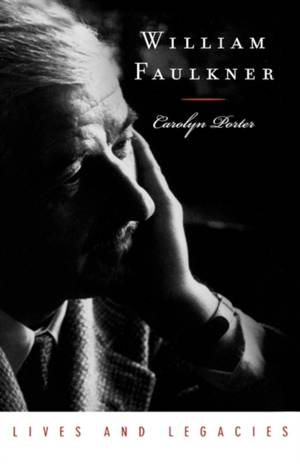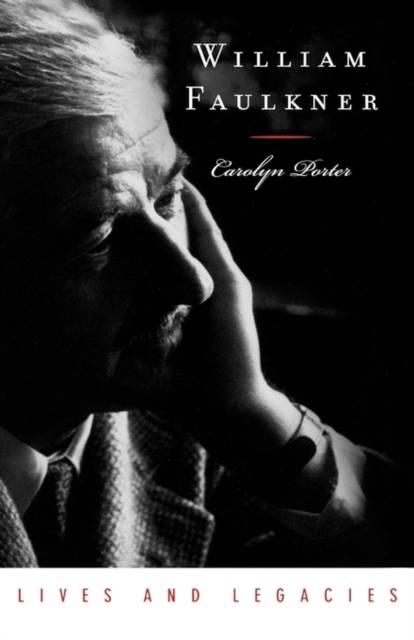
Bedankt voor het vertrouwen het afgelopen jaar! Om jou te bedanken bieden we GRATIS verzending (in België) aan op alles gedurende de hele maand januari.
- Afhalen na 1 uur in een winkel met voorraad
- In januari gratis thuislevering in België
- Ruim aanbod met 7 miljoen producten
Bedankt voor het vertrouwen het afgelopen jaar! Om jou te bedanken bieden we GRATIS verzending (in België) aan op alles gedurende de hele maand januari.
- Afhalen na 1 uur in een winkel met voorraad
- In januari gratis thuislevering in België
- Ruim aanbod met 7 miljoen producten
Zoeken
Omschrijving
In this newest volume in Oxford's Lives and Legacies series, Carolyn Porter, a leading authority on William Faulkner, offers an insightful account of Faulkner's life and work, with special focus on the breathtaking twelve-year period when he wrote some of the finest novels in American literature.
Porter ranges from Faulkner's childhood in Mississippi to his abortive career as a poet, his sojourn in New Orleans (where he met a sympathetic Sherwood Anderson and wrote his first novel Soldier's Pay), his short but strategically important stay in Paris, his "rescue" by Malcolm Crowley in the late 1940s, and his winning of the Nobel Prize. But the heart of the book illuminates the formal leap in Faulkner's creative vision beginning with The Sound and the Fury in 1929, which sold poorly but signaled the arrival of a major new literary talent. Indeed, from 1929 through 1942, he would produce, against formidable odds--physical, spiritual, and financial--some of the greatest fictional works of the twentieth century, including As I Lay Dying, Sanctuary, Light in August, Absalom, Absalom! and Go Down, Moses. Porter shows how, during this remarkably sustained burst of creativity, Faulkner pursued an often feverish process of increasingly ambitious narrative experimentation, coupled with an equally ambitious thematic expansion, as he moved from a close-up study of the white nuclear family, both lower and upper class, to an epic vision of southern, American, and ultimately Western culture.
Porter illuminates the importance of Faulkner's legacy not only for American literature, but also for world literature, and reveals how Faulkner lives on so powerfully, both in the works of his literary heirs and in the lives of readers today.
Porter ranges from Faulkner's childhood in Mississippi to his abortive career as a poet, his sojourn in New Orleans (where he met a sympathetic Sherwood Anderson and wrote his first novel Soldier's Pay), his short but strategically important stay in Paris, his "rescue" by Malcolm Crowley in the late 1940s, and his winning of the Nobel Prize. But the heart of the book illuminates the formal leap in Faulkner's creative vision beginning with The Sound and the Fury in 1929, which sold poorly but signaled the arrival of a major new literary talent. Indeed, from 1929 through 1942, he would produce, against formidable odds--physical, spiritual, and financial--some of the greatest fictional works of the twentieth century, including As I Lay Dying, Sanctuary, Light in August, Absalom, Absalom! and Go Down, Moses. Porter shows how, during this remarkably sustained burst of creativity, Faulkner pursued an often feverish process of increasingly ambitious narrative experimentation, coupled with an equally ambitious thematic expansion, as he moved from a close-up study of the white nuclear family, both lower and upper class, to an epic vision of southern, American, and ultimately Western culture.
Porter illuminates the importance of Faulkner's legacy not only for American literature, but also for world literature, and reveals how Faulkner lives on so powerfully, both in the works of his literary heirs and in the lives of readers today.
Specificaties
Betrokkenen
- Auteur(s):
- Uitgeverij:
Inhoud
- Aantal bladzijden:
- 224
- Taal:
- Engels
- Reeks:
Eigenschappen
- Productcode (EAN):
- 9780195310498
- Verschijningsdatum:
- 24/05/2007
- Uitvoering:
- Hardcover
- Formaat:
- Ongenaaid / garenloos gebonden
- Afmetingen:
- 147 mm x 214 mm
- Gewicht:
- 371 g

Alleen bij Standaard Boekhandel
+ 83 punten op je klantenkaart van Standaard Boekhandel
Beoordelingen
We publiceren alleen reviews die voldoen aan de voorwaarden voor reviews. Bekijk onze voorwaarden voor reviews.









